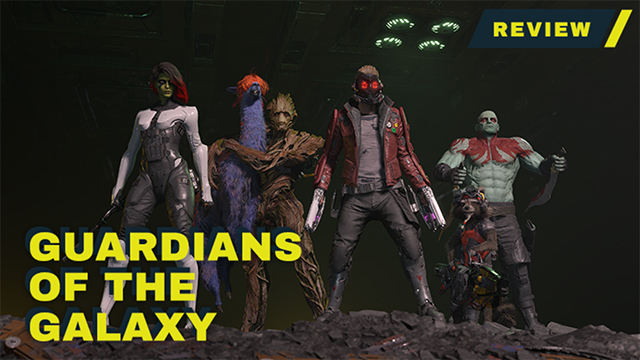The Guardians of the Galaxy are underdogs within the Marvel universe as they’re not as popular as the X-Men, strong as the Avengers, or optimistic as the Fantastic Four. But the strengths of those three teams has rarely resulted in a good video game, which was most recently seen in 2020’s soulless Avengers title. In true dark horse fashion, Eidos-Montréal’s Guardians of the Galaxy game provides an excellently told story, well-defined characters, strategic combat, and beautiful alien worlds and comes in where Marvel’s other hero squads couldn’t.
Guardians, first and foremost, surpasses its contemporaries because of its overall setup. Instead of naturally being a cooperative game, it’s a traditional single-player experience. There’s no loot, microtransactions, repeatable missions, or any other sort of mechanic there to dilute the narrative; the game is entirely dedicated to and built around its story.
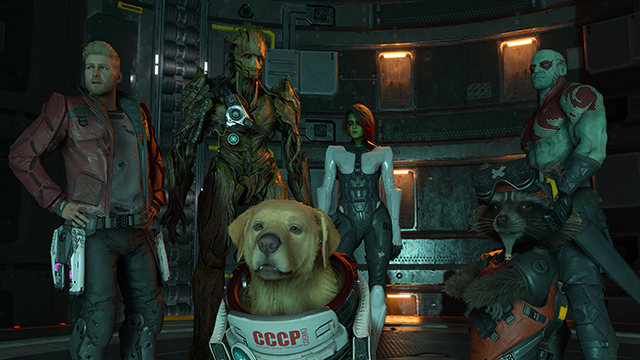
And this attention shows in its quality. Guardians of the Galaxy picks up right after the five have joined forces. Trust is in semi-short supply, but a galaxy-wide threat means that they’ll have to grow up in order to earn their titles as actual Guardians. The overall premise is fairly standard — the same could almost exactly apply to the 2014 film — but the magic lies in how it tells its tale. Guardians is wonderfully written and this strong script drives everything, encompassing its characters, dialogue, overall plot, and, surprisingly, gameplay.
The five Guardians are the stars of the show and will likely be familiar to anyone who has seen the films (and sometimes, a little too familiar). But Eidos-Montréal uses that template as shorthand and builds on it by adding new details to almost all of them and diving a little deeper, which works in a longer form of media like a video game.
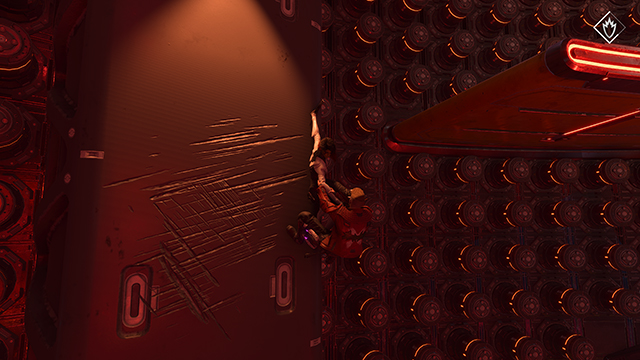
And it utilizes the video game medium to further examine its protagonists. Its collectibles aren’t random, mindless doodads, but authored trinkets that can bring up new dialogue for a certain crew member. These fill in backstory incentivize exploration for the player and also give Star-Lord more ways to empathize with his new crewmates.
But this gameplay and story bond takes place more prominently other parts of the game. A pissed-off teammate may abstain from fighting or reject commands. More powerful abilities are also unlocked only when a character overcomes a personal struggle, meaning that emotional growth is coupled with physical growth. And certain tasks that the player previously had to issue out began happening automatically as the team begins to grow more in sync. They’re small touches, but incredibly thoughtful ones and show that Eidos-Montréal ensured that the story and gameplay were always in lockstep.
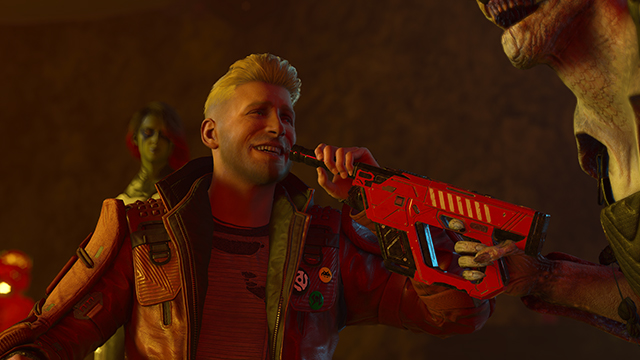
A lot of this is further realized because of the particularly strong dialogue and performances. Guardians of the Galaxy‘s is surprisingly hilarious with an onslaught of jokes that often are cleverly written and skillfully delivered. They run the gamut from one-liners to traditional comedy bits and, more remarkably, the title also utilizes camera movements and animation to sell its punchlines, which video games don’t often do. Funny games usually (and almost exclusively) rely on their writing as most don’t have solid enough cinematography or animation that live-action comedy relies upon. Guardians of the Galaxy has detailed enough facial animation to sell the nuances of humor and those nuances go a long way, even for the few jokes that don’t quite land.
The facial animations and performances work in more serious moments, too. The same small movements that can augment a joke can also augment a more dramatic or sad scene, something that is most clearly evidenced by its stunningly accurate “almost crying” eyes. While the writing paints them as flawed characters with highs and lows, the actors are able to bring those words to life while the tech also accurately conveys those exceptional performances. Each aspect makes the other better and is impressive considering Eidos-Montréal’s history of stiff animation and the cast’s relative obscurity. However, it is tonally fitting for a Guardians of the Galaxy game to star a collection of unlikely heroes.
Although the game uses its dialogue to further its plot and develop its characters, it is an extremely chatty game in a way that would even make Deadpool blush. It takes Naughty Dog’s brand of dialogue during traversal that has taken hold over the past decade and extends that to almost every minute of gameplay. Every part of the critical path is filled with dialogue, every side route has an associated quip with it, and most fights almost have long bits of banter throughout; there’s almost never more than 30 seconds of silence even when meandering for too long in the same room. It’s mostly written well and does often entertain during the combat-free portions or provide a funny joke or some insight, but there are a few points where it’s filler and more difficult to take a breather since its breaths are always being used to speak.
Guardians of the Galaxy‘s cast does take center stage, but its actual plot plays a significant role in their development. The story itself is designed in a way that specifically calls on its characters to change and forces them to grow in order to succeed. The threat of the Universal Church of Truth’s Promise is a mental one and one the Guardians can’t topple simply by shooting it. There are plenty of antagonizing forces to blast, but creating a compelling internal conflict and external one makes it all more resonant. It is simple to follow, clearly justifies why each level matters, and full of earned twists and turns that grow along with the story — all of which can’t be understated — but having a narrative that drives character arcs while reinforcing its themes is a big part of why Guardians of the Galaxy‘s story is so sensational.
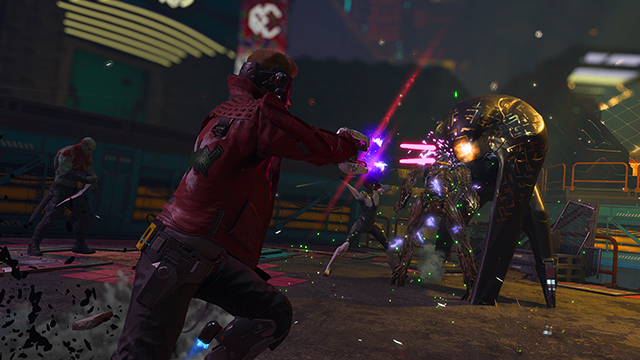
Its gameplay isn’t the weak part of the experience, though. Players only directly control Star-Lord and order around the other four members through easy-to-reach commands on the face buttons. Puzzles use this intuitive setup to great effect, but it’s more prominent during combat. Each has a few moves that are governed by cooldowns, meaning that it’s up to players to manage their squad’s abilities while evading attacks in real-time.
Blending tactical and real-time elements is unique and keeps fighting from growing stale since it draws from two different styles of play. Exploiting weaknesses, stacking damage multipliers, and discovering combos is satisfying and the game is open enough to allow players to experiment and find what works for them. Doubling down on stun damage and freezing enemies can work just as well as piling up damage multipliers and using Gamora’s abilities to set up devastating blows. Each fighter has a specialty — crowd control, damage, stun damage, and immobilization — but they all also have moves that get out of their category, allowing for even more room to test out new combos.
Combat is wholly gratifying yet could also use some tweaks to reach its full potential. It’s generally pretty easy and while the game has a staggering amount of independent and helpful difficulty sliders, cranking them up doesn’t quite lead to a challenging experience that makes the most out of its strategic elements. And even though there are multiple enemy types, few change how battles are fought. Since most are just standard melee or ranged archetypes, there is a distinct lack of foes can affect the battlefield in unique ways, meaning that there is also not much in the way of enemy prioritization. As games like Doom have shown, analyzing the enemy layout is more satisfying when they all have a unique purpose. The game also runs out of upgrades just over its halfway mark, making its currency useless.
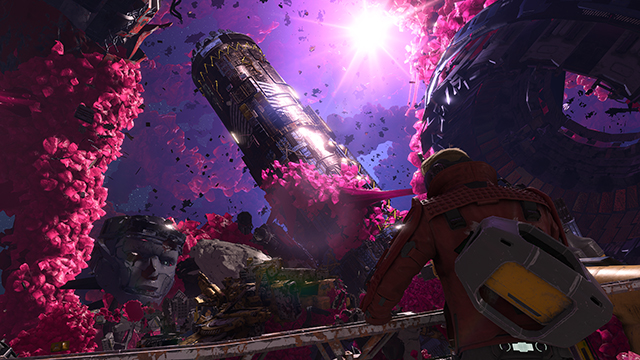
Its enemy design is often creative, which extends to its world design, as well. Guardians of the Galaxy‘s alien worlds feel distinctly alien and are drenched in saturated colors that are absolutely stunning to look at. Even its more mechanical settings are gorgeous and seemingly take inspiration from Eidos-Montréal’s time making Deus Ex games, but it realizes them through a more fantastical lens. Its stylistic depictions of otherworldly settings is artistically strong and also supported by its technical chops that ensure that its all highly detailed and extremely well lit, too.
Guardians of the Galaxy is a lot like the actual members of the Guardians of the Galaxy. It’s got Star-Lord’s wit, the tragic underpinning of Gamora and Rocket, Drax’s combat prowess, and Groot’s tender heart. All of its elements are strong on their own, but much stronger as a unit. Eidos-Montréal can even relate to the Guardians as it had to step out of its comfort zone and grow for this game; a successful move that resulted in a memorable and marvelous experience.
SCORE: 9/10
As ComingSoon’s review policy explains, a score of 9 equates to “Excellent.” Entertainment that reaches this level is at the top of its type. The gold standard that every creator aims to reach.
